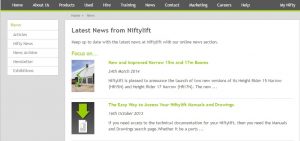 Novelty attracts – or so we’re told. If you want to get repeat visitors to your website then you need to be offering them ‘new stuff’ with each visit. Perhaps the popularity of blogs is partly because you’re likely to get something new each time, right at the top of the home page.
Novelty attracts – or so we’re told. If you want to get repeat visitors to your website then you need to be offering them ‘new stuff’ with each visit. Perhaps the popularity of blogs is partly because you’re likely to get something new each time, right at the top of the home page.
It’s a short jump from the idea of ‘new’ to the idea of ‘news’, in the sense of reporting on recent events. So we see organisations putting a ‘what’s new’ section on their home pages and then populating it with news – about themselves.
Is your organisation interesting?
Newspapers don’t sell copies on stories about … newspapers. Or not very often. Occasionally, a story about a circulation battle or a takeover might make it into the business section but that’s about it. Instead, they look for something that will grab the interest of their likely purchasers: events that affect a lot of people, or about a few people that a lot of people are interested in (is that a definition of ‘celebrity’?).
So the first test of anything that appears in your ‘news’ section is: are your users likely to be interested in it?
It’s less boring if it offers a benefit
You can create interest in your news if it contains a clear benefit to the users. “And now with FREE GIFT” – that’s news. Providing, of course, that the users want the free gift.
If it’s broadcast news, it’s news
Some events appear in broadcast media just because the media have decided that they are newsworthy. Maybe it’s a slow news day. Maybe there is an eye-catching picture (fires get reported more on television than on the radio). But the point is that those messages will reach a broader audience – self-defining, really, by the term ‘broadcast media’.
Let’s say we’re creating a home page for Acme Plastics, Inc, a manufacturer of plastic tubing. (Yes, I made them up). Acme wants something for its news column, and the national news is full of Hurricane Rita? ‘Acme adds its support to the victims of Rita’ just exploits the events without adding any value to for the visitor.
But if your organisation has a perspective on the current broadcast news, then exploit it. “Acme tubing helps to pump out after Katrina’ links to the events in the public conscious but adds to them.
But don’t just repeat stories that other media are going to report better than you are.
If it’s an emergency, it’s news
After Katrina, many organisations had emergency home pages that were aimed at dislocated workers who no longer had access to their own intranet. I haven’t yet seen any analysis of whether this harmed the user experience of their ordinary visitors – but I’d be extremely surprised if it did. Let’s just think it through for a moment by returning to Acme Plastics. Let’s say they’ve had a small disaster: a new machine was going to be commissioned this week, but the truck delivering it crashed and they won’t get it for another month. Orders will be late and customers will be unhappy. Now, should they come clean or not?
My argument would be: tell people. If your delivery trucks are crashing every day, then perhaps you should be doing something about it other than an announcement on your website. But if there’s an issue that customers need to know about, then you’re better informing them quickly and accurately. If you don’t know when the problem will be solved, then tell them that instead – with a note about when you will know, and when you’ll announce that. They’ll find out anyway by rumour, so you may as well get your side of the story out there.
If it’s old, then it isn’t news
Here’s a current news story from a local government website. Headline: ‘Freedom of Information Act’. Opening sentence in story: ‘The Freedom of Information Act 2000 was passed by Government to encourage free and open access to information held by Public Authorities across England, Wales and Northern Ireland’.
Even in local government, 2000 was five years ago. If there’s some news hidden away in that article then they definitely made it too hard to find. News needs to be, well, new. As a minimum.
Creating a ‘news’ area also creates a commitment to keep it fresh. You can manage the effort somewhat by the title. ‘This month’s news’ creates an expectation that you’re going to update it monthly. ‘This year’s news’ sounds a touch slow-moving, don’t you think? And ‘Today’s bargain’ with an offer that expired yesterday is positively off-putting.
Summary
If you’re thinking of having a news section to your website, make sure that it’s interesting, offers an angle that is unique to you, and that you’re willing to keep it up to date.
This article first appeared in Usability News, 26 September 2005
